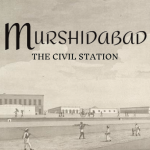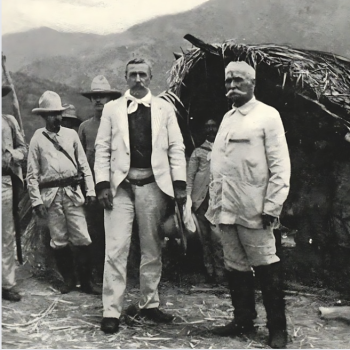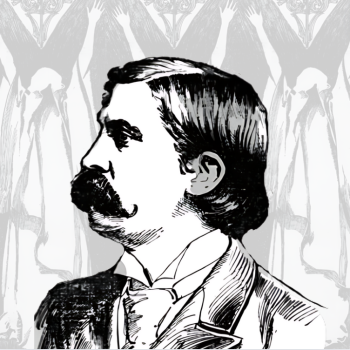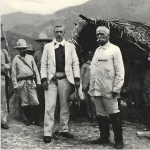BRICKS OF OPIUM
Charles Johnston
January 1889.
Tuite-Dalton gave me charge of a police-court, in which I presently found myself face to face with a plaintiff, a prisoner, numbers of dusky witnesses, some sleek policemen, and a row of glib, grinning native lawyers, come to look over the new “Sahib,” which is to say, a gentleman of Europe.[1] Seated in the chair of state amid this waiting throng, keenly conscious of the unfamiliar tongue, I felt greatly embarrassed, especially when it became evident that I must deliver some kind of judgment. I forget what I decided. I think I fined the plaintiff and dismissed the case, but am not certain.[2]
While unusual this would not have been illegal; for the Indian Procedure Code contains a provision, whereby the plaintiff may be punished for “frivolous and vexatious prosecution.” This is far from superfluous; for a Bengali who has made a moderate fortune, does not think of buying yachts and automobiles, but looks about for a nice estate with a score of pending lawsuits on it, and settles down to enjoy these to the end of his days.
In that dingy court I dispensed indifferent justice for a year, six months under a swinging punka that made eddies in the hot air. During that time I gradually realized what it is the British Government does for India, in one important field. The government confers on India the assured possession of civil rights,-security of person and security of property. This is something India never enjoyed under the many forms of native and foreign Asiatic rule which preceded the British Government; and it is an inestimable boon, far more vital than the franchise or the forms of democracy. The extent to which the secure possession of civil rights benefits India came home to me gradually, as I sat there day after day in the police-court, receiving crowds of dusky litigants, trying petty assaults and small theft cases, and seeking, as far as the inventive faculty of the witnesses made it possible, to render equal justice. The courts were open to all. Justice was rapid and cheap, and, as everywhere throughout the Indian Empire, wholly impartial and impersonal.
There was much to do every day at the cutcherry. There were, first, the criminal trials for the day, though the petty pilferings and thumpings of these guileless folk little deserved the high serious name of crime, such as the Abkari cases, the prosecutions of blear eyed persons charged with distilling illicit rice wine under the stark radiance of the Indian moon.[3] One case I remember; a witness for the prosecuting Abkari department, which is to say, Excise, filled me with hopeless wonder at his splendid, disinterested inveracity.[4] With rolling eye, he told me a small room, a yard or so square, indicating its precise dimensions on the rail of the witness-stand before him; then he related how wild revelers thirsting for rice-wine, came pouring in—ten, twenty, thirty, forty, fifty, of them, gathering in that tiny cubicle to make merry and carouse. By his telling, never was such furious dissipation, such unbridled delinquency; fifty men—or was it sixty?—singing and dancing and wassailing in a square yard of space.
You cannot indict such a shock-headed, wild-eyed fellow for perjury; it would be too ridiculous There is one way, I have been told, to get the truth out of the most depraved Bengali; to fill his palm with Ganges water, and then bid him testify. But I have a notion that this fellow, were he immersed in Ganges to the lips, or in subterranean Phlegethon for that matter, would still gurgle out his sublime fantasies.
Then there was the governmental dispensing of ganja, or hashish, a kind of withered aster, and of blocks of opium, a duty which did not rejoice my heart. The British Indian Government does not sell these things; it receives them in bond from the growers, and distributes them, with a whacking excise duty added to the cost, to licensed dealers, who peddle out to their clients the fuel of dreams.
The opium came in blocks as big as bricks, weighing a Bengali seer, or two pounds; the duty on each brick being, as I remember it, some twenty-eight rupees at three to the dollar. I confess to having sold enough of this acrid stuff to demoralize a city, supposing the traffic to be as noxious as its critics aver. I wish, therefore, to say thereon these two things: first, that the British Raj has three courses open to it to forbid all growing of the rose-red opium poppy, which might be over-tyrannous; or to allow its cultivation free of all restriction; or to lay such a tax on it as shall bring in a good revenue, and at the same time greatly discourage, while not absolutely prohibiting, its use. This last is the course followed by the British Raj. Secondly, I depose that, so far as my limited observation went, opium was used chiefly by hopeless invalids, sufferers from cancer, or leprosy, or the disfiguring maladies of the East; this would seem to be the reason why pictures of Indian opium-dens show such ghastly wrecks of humanity. Opium is not the cause of their miserable state, but its palliative. The natives of India are, on the whole, admirably temperate, as they are wonderfully free from serious crime.
As for revenue from opium, and the reprobation that goes with it, the government of India is in a quandary. It must tax something, or go bankrupt out of hand. The Permanent Settlement of a century ago pledged the government of Bengal never, on any plea, to increase the tax, or government rent, at that time laid on land; and in spite of every need this promise has been sacredly kept. So rupees must be raised elsewhere; and not very creditable taxes, like this on opium which hurts no one but the users of it, or the far more onerous tax on salt, are the best expedients that have so far been hit upon, to fill the big hole in Bengal’s revenues.[5]
A little later, I made the acquaintance of another of the great blessings conferred on India by its present government: security of contract. The general idea of a contract in India was something vague and entangling. The party of the first part immediately tried to put in phrases and figures favorable to himself. The party of the second part did the same. The result was that the two copies never agreed, and the little alterations were so skillfully made, that it was not easy to detect them. The art of forgery was carried to a high degree of perfection, and one could procure documents looking centuries old, within a few days. One expedient was to put the document on the floor of a cage in which mice were kept, with the result that in a week or two the parchment looked a hundred years old. This elasticity has all been done away with, and contracts have acquired a rigidity quite foreign to the former ideas of India. The contract is brought to the court, a copy is made in a huge ledger, which is duly signed by a court officer, and the two parties; and, in all disputes, this official copy, which is kept in the court safe, is taken as the standard. In this way the principle is introduced that “a bargain is a bargain,” and a degree of finality hitherto never known in India is assured to the written agreement.
Security of contract is thus added to security of the person and property; and in both cases any native can learn his exact legal position without the slightest difficulty. For the Penal Code, which defines the rights and duties of the individual, and the Contracts Act are translated into every one of the scores of languages recognized by the government pf India, and anyone can buy a copy for a few annas in the native bazars. The Penal Code is uniform all over British India, and it makes no distinction of race, creed, caste, color, or sex, dealing even-handed justice to all alike. Each person, as a person, has his or her defined civil rights; and the whole authority of the government is available, and rapidly available, to secure them. “Justice is denied or delayed to no one.” When we come to the laws of property, this uniformity disappears. Property in India is inextricably bound up with religious usages because the great religious reformers of past ages almost- always drew up a code of laws for the people, such as Moses is believed to have drawn up for the Israelites. In the East, these religious law-codes remain for ages, and be- come inextricably blended with beliefs and rites. So it is in India. The Hindus, the largest section of the population, still regulate their family affairs by the Laws of Manu, while the Muhammadans, who come next to them in number, found their family life on the precepts of the Qur’an. And so with the Buddhists, the Jainas, and a dozen other religious communities.[6]
← Table Of Contents →
SOURCES
[1] Johnston, Charles. “Helping To Govern India.” The Atlantic Monthly Vol. 108, No. 5. (November 1911): 643-652.
[2] Johnston, “Helping to Govern India.” American Political Science Association, 1906, (1906): 169-179.
[3] Johnston, Charles. “How The Army Was Kidnapped.” The Atlantic Monthly. Vol. CXIV, No. 4. (October 1914): 469-477.
[4] One of the first actions undertaken by Steuart Bayley, the Lieutenant-Governor of Bengal, when assuming office in 1887, was the restructuring of distillery practices of outstill and sadr distilleries, and their taxation. 1888 saw a decrease in the revenue derived from the sale of country spirits in the Chittagong Division. (Some believed that the abstention of alcohol was inspired by a visit from Colonel Olcott. Others speculated that the people took to “ganja and opium instead of in country liquor, for the excise revenue from these two sources has increased.”) [Buckland, C.E. Bengal Under The Lieutenant-Governors Vol. II. S.K. Lahiri & Co. Calcutta, India. (1901): 857-862.] As stated in The Calcutta Review in January 1889: “If drinking habits largely increase among a class of landless labourers who live by daily labour it is not to be wondered at if a certain proportion of them should endeavor to supplement their legitimate income in dishonest ways.” [Phillips, H.A.D. “The Out-Still Question In Bengal.” The Calcutta Review. Vol. LXXXVIII. (January 1889): 29-41.]
[5] Johnston, Charles. “Helping To Govern India: Kandi Subdivision.” The Atlantic Monthly. Vol. CIX, No. 2. (February 1912): 265-273.
[6] Johnston, “Helping to Govern India.” American Political Science Association, 1906, (1906): 169-179.













